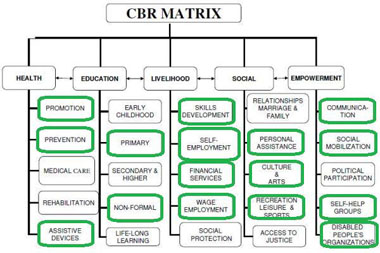The 3rd Asia-Pacific CBR Congress
Self-help groups (SHG) and Disabled People Associations (DPOs) support towards people with disabilities self-empowerment and community participation
Tibet Autonomous Region is one of the most remote regions of China with a scattered population. According to the 2006 National Disability Sampling Survey, Tibet Autonomous Region (TAR) has a population of almost 3 million people, more than 80% of them being nomadic or semi-nomadic. Among them, 194,000 have disability (7% of the entire population in Tibet). People with disabilities and their families have very little access to disability related information and services. Disability knowledge of the whole community is very low and the community usually believes that disability is a result of bad actions done in the person’s previous life and that nothing can be changed. Most of people with disabilities and their families stay at home, are ashamed of their situation, and don’t have the habit to share their concerns with others. They are over-whelmed with their difficulties, and often sidelined in usual sharing of burden and reciprocal aid that community members will provide to each other’s during specific moment such as the harvesting period.
Under the leadership of the TDPF (Tibet Disabled Persons Federation), semi-governmental body mandated to address disability related issues in China, the state government is putting lot of efforts in developing disability oriented services (access to rehabilitation, special schools and special vocation training center). Nevertheless, currently in the whole TAR, only one rehabilitation center at regional level is well developed but with little access to people with disabilities (2 currently setting up). DPF system is still weak and exists only at regional and prefecture level. At county and township levels, disability issues remain under the responsibility of the Civil affairs bureau, usually understaffed and not trained to address disabilities issues.
The development of DPOs and SHG over the 15 last years in Tibet has largely contributed to the improvement of the situation of people with disabilities and their families.
HI worked for almost 15 years in TAR with the TDPF on improving the living condition of people with disabilities and their families. We supported the disability movement development in this region (SHG and DPOs development, management and advocacy skills, community mobilization and communication, peer support…) and people with disability empowerment and full contribution to the society growth.
Development of the disability movement: the specific case of DPOs and SHG
DPOs active contribution started with the deaf association creation in 2001. This civil society based DPO and the government led ones (3) are only represented in Lhasa, TAR main city. DPOs also reach rural areas in Lhasa surroundings, were they support the development of SHGs.
Since 2007, CBR projects developed jointly by Handicap international and the TDPF fostered the creation of SHGs. They were created to help people with disabilities and parents of children with disability to overcome the feeling of shame related to disability, and gather and share their experiences. It firstly started in Lhasa (group of parents of children with disabilities), with the input of the project, and there are today 25 small groups gathering 280 members, among them 148 have a disability. SHG act as a relay compensating the absence of DPF representation in rural areas. They will report on their activities to the DPF. SHG do not benefit of any official status, even though the Lhasa DPF extended the SHG in its 7 counties (rural areas), and some SHG exist in 2 other provinces.
SHG and DPOs are used by members as platforms to get information about disability and related issues, share their experience and concerns among peers, and as an opportunity to meet other people with similar needs. SHG and DPOs support individual and collective capacities development, and families economic conditions by facilitating access to income generating activities, business development, and access to vocational training and grants.
In rural areas, all the SHGs also promote each other’s help during busy season of the farming (planting and harvesting period). Some also work on resource mobilization to raise fund to sustain their activities. SHGs collect information and needs from the people with disabilities in the community and share results with local authorities and DPFs.
Mostly active in urban areas, DPOs also coordinate with higher level bureaus (TDPF, Vocational schools, Employment bureaus) to receive more services. DPOs also organize regular non formal literacy class for people with disabilities.
Both in urban and rural, disability awareness raising and inclusive activities are activities carried out by SHGs and DPOs, aiming at changing the community attitude towards people with disabilities. SHG and DPOs bridge the community with people with disabilities and their families, as the latter become more confident, get their needs answered, and eventually contribute to the community development. SHGs and DPOs are therefore considered as a community based resource to get information on disability, and support people with disabilities in their daily life. Despite the lack of official status, DPOs and SHGs are looking at possible extension in the region.
Benefits of counting on DPOs and SHG: some successful stories
*Lhakpa Tsering is from Sephu village of Qushui county, Lhasa municipality. He has a visual impairment since birth. Now he is 45 years old , married and has two children. His wife has epilepsy. Before he joined the SHG, they live in a small dark house which they borrowed from the village committee. Their only income was from their very small grocery shop, also supported by the village committee. In 2011, Lhakpa Tsering joined the SHG and shared his concerns. He received 5000CNY grant free of interest from the CBR project and local civil affair bureau to increase his grocery items. His business is now good and Lhakpa Tsering returned the grant within two years to the civil affair bureau. Members helped him to get 250 m2 piece of land from the village committee and to be included in the government plan for reconstruction of dangerous house. Now he lives in his own house. He also received a tsampa (barley product) grinding machine from the village committee to increase his income. Being a member of SHG helped him to find his way towards an independent life and become a model for villagers with disability.
Sonam Daka from Medrogongka County, Gongka Township, attends the Lhalung village self-help group, since 2008. Her husband has a mental illness and her daughter cerebral palsy. The whole family relies on her for living. After joining this group, the quality of her life drastically changed, and with her husband she feels happier. Before, people in the village were teasing and name calling her husband, running away when seeing him. Therefore, most of the times, he was locked inside the house when she was working in the field. Frequent disability awareness sessions organized by the group in the village have contributed to stop villagers bad behavior. People are not scared of him anymore, and her husband walks in the village. The SHG also submitted an application to the village committee for Sonam Daka house reconstruction, and the group members help her in the field during the busy farming season. Sonam Daka and her husband have now a nice new house and a nice living environment where people care for them. Sonam Daka doesn’t feel lonely anymore, and is deeply grateful to the SHG support.
My name is Tenzin Chuedron, 22 years old I became Deaf at the age of 7 because of an overdosed injection during a flu. My family relies on farming activities and I have 4 siblings. I never attended school because my parents did not see the purpose as I was Deaf. Consequently I did not develop my literacy skills. As a child I liked very much playing with other children, but they were making fun of me and excluding me from their play. As a result, and for my protection, my family did not let me go outside alone. 5 years ago, my mother became very sick and when she died nobody took the time to explain me she passed away. I thought my mother was gone for treatment but later I realized my mother won’t come back. In my community, I was very lonely and felt very much discriminated. My father was informed by the village secretary about the Vocational Training Base (VTB) program focusing on youth with disability. I was thrilled about this news, because I always wanted to learn some skills such as carpet making. At home, I was just doing household chores and almost no one tried to communicate with me. Soon after joining the VTB, I became a member of the Tibetan Deaf Association (TDA). I learned Tibetan Sign Language and made a lot of friends who are deaf. I feel part of a community that shared the same difficulties and concerns. In my village, there was another deaf boy but I had no contact with him because I was feeling too shy to approach him. In VTB I learned sewing for a year; I am currently practicing in a handicraft studio run by a hotel in Lhasa. For the preparation of the International Day of Persons with Disabilities, I learned Indian dances. I feel this helps me to overcome my shyness. The hotel where I am employed believes in my capacities. Occasionally, I perform dances in front of groups of tourists. The hotel manager plans to train me as silent yoga instructor.
Joining TDA was really helpful to improve my communication skills. Moreover, I learned a bit of Chinese writing. I would like to develop my literacy and calculation abilities in which I feel to be still weak. After almost 1 year in Lhasa, I came back to my village. I could not really see a positive change in the community attitude towards me. Even worse, some youth who stayed in the village are jealous about the training opportunity I got. But I feel that I have gained a lot of confidence, I try to communicate more with others. When people are calling me with bad names, I don’t feel hurt any more. This year at my village festival, I was extremely proud to treat my brothers and cousins with food thanks to the money I have earned in my job placement.
More of disability movement in Tibet Autonomous Region: figures and future
DPOs and SHGs have a big impact on persons with disability, their families and the community. The project did a small survey on the SHG impact for 47 members in 2013 and the result shows that 93.6% of respondents mentioned that SHG made an important difference in their life, 89.3% mentioned that they feel happier after joining the group, 80.8% mentioned that they feel less isolated and 93.6% mentioned that they want to sustain the SHGs. Village leaders have mentioned that SHGs are a resource for them and help to reduce their burden.
Even though there is no specific allocated fund, government is paying attention on the development of SHGs and DPOs in CBR. Tibet and Lhasa DPF are taking initiatives to develop new SHGs. TDPF provides DPOs’ staff salary and DPOs can get TDPF financial support upon application, to organize their planned activities. Some of the SHGs also raise fund locally and receive support from village and township government. SHGs focusing on vocational training and employment activities get financial support from the Quota system fund supporting the employment of people with disabilities (government led).
Sustainability ad visibility of DPOs is not yet fully insured. Ways to address it are known: being included into the 5 years government plan in order to get funds for activities, organize formal experience exchanges among existing SHGs of different prefectures, get DPFs regularly supervise and follow up activities, get access to training on self-management, advocacy and resource mobilization is needed to strengthen their capacities. Distances between villages hinder members’ capacities to gather more often, and negatively influence their motivation to work together. More SHGs would be needed to absorb these difficulties.
On another hand the government might be worried in having too many SHGs/DPOs formed and raising their voice.
A balance is yet to be found…
Slide 1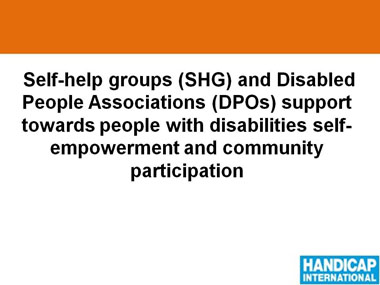 (Slide 1 text)
(Slide 1 text)
Slide 2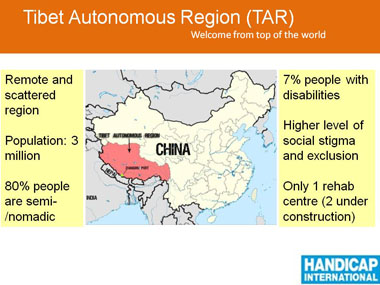 (Slide 2 text)
(Slide 2 text)
Slide 3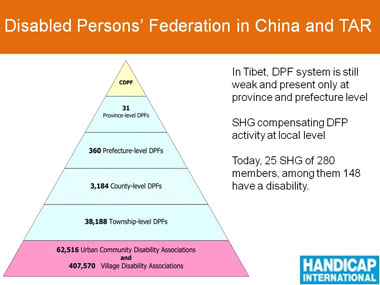 (Slide 3 text)
(Slide 3 text)
Slide 4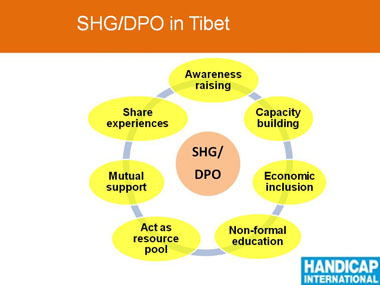 (Slide 4 text)
(Slide 4 text)
Slide 5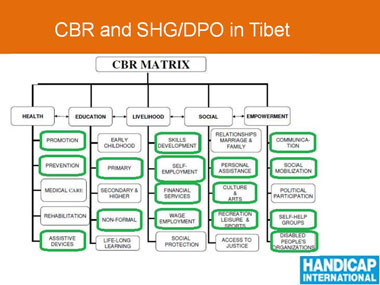 (Slide 5 text)
(Slide 5 text)
Slide 6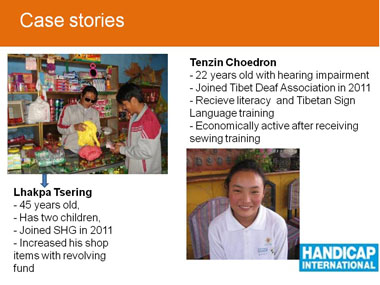 (Slide 6 text)
(Slide 6 text)
Slide 7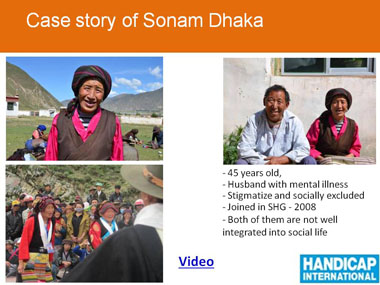 (Slide 7 text)
(Slide 7 text)
Slide 8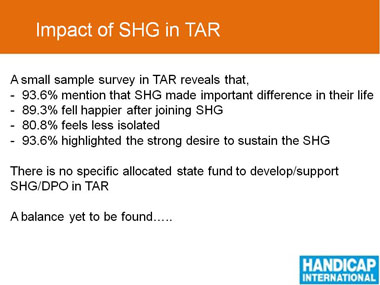 (Slide 8 text)
(Slide 8 text)
Slide 9 (Slide 9 text)
(Slide 9 text)

